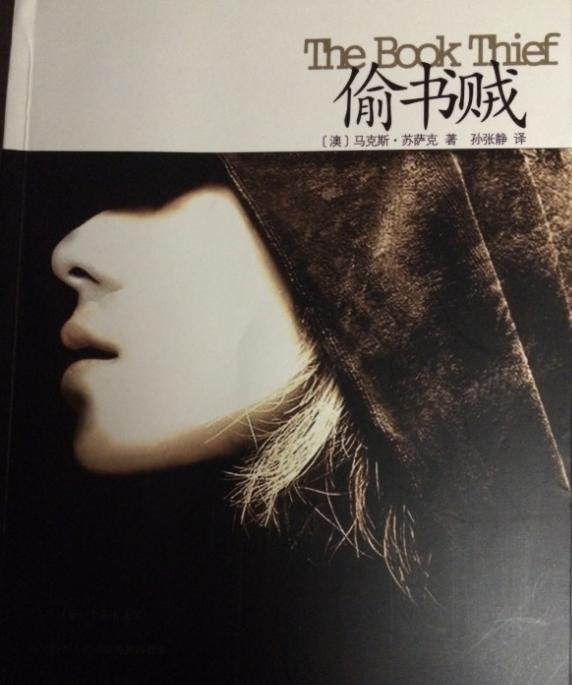1.
The Book Thief
Author: [Australia] Max Susak

The Book Thief is a peculiar book that tells a story from the third perspective of Death. Tell a "memorable story of how books inspire the soul".
The narrative unfolds from the perspective of a god of death, and the most just person under the war is none other than the god of death, who sees all life without any emotion, and exists purely as a worker who leads the soul to belonging. But he was watching the thief, the girl Lissell. In that process, Memminger gradually revealed the emotions that had accumulated like a volcano in his boring and mechanical work of transporting souls. The cover phrase "This is a unique story about how words feed the human soul and a story that shakes the grim reaper.". The small characters are arranged in the corners of the book, but they burst out the soul of the whole story. Yes, shake the Grim Reaper.
This grim reaper is adept at stating the different skies, those related to the dead and the survivors. Observing those skies became a small pastime at work, and the colors of those skies recorded all the emotions of death in that moment. And for the book thief, those colors are laid out as a survivor of pain. She was a survivor, she was always a survivor, and the people she loved kept leaving, leaving, desperate to the point of numbing pain. The first time Death saw the book thief was when her brother died, when the sky was red, and at that time, the book thief got her first book, the Gravedigger's Manual.
Such a book, which few people would be interested in reading, had dug up the tomb that buried the book thief's thirst for knowledge.
During this time of war, this "book thief" had "stolen" to many pleasures. Those pleasures were eventually re-stripped away by the war. But at least, it was once owned.
2.
The Diary of Anne Frank
Author: [de] Anne Frank
"The Diary of Anne Frank", as a record of the mood of a young girl at the age of 13-15, is plain in language and difficult to judge from a literary point of view, and the plot is simple, just a daily description of life in the secret room. In this way, it seems that it is not even a charming book, but only a mirror image for people to reflect on war because of its special era background. In fact, Anne said in her diary that she was eager to write and had tried to follow the path. But her diary is by no means a modified language magic, but in a few words, a picture of a quiet and peaceful life is laid out warmly.
Anne rarely wrote positively about the war in her diary, and her knowledge of the state of the war was mostly oral or radio news. In that era, she was a universal representative of the Jewish people, experiencing tragic experiences shared by many Jews. She was a victim of war, but she rarely felt the melancholy of smoke and ruins in her diary. This is the great thing about children, and while adults care about the speed of advance on the Allied front, they still spare no effort to tap into the distorted lives of the happiness and small pleasures that people should enjoy in the world. In unfortunate circumstances, children are more susceptible than adults, more likely to close themselves off, but they are also more likely to adhere to faith and purity of heart, and firmly believe in the righteous power of the human soul.
Anne was such a child. In the "Anne Frank Diary" about the war, almost all words of encouragement can be found. Living in the fear of worrying about the passage of life day and night, Anne was once lost, but never despaired, never gave up believing that justice and love will triumph, the forces that destroy human life and dignity will disappear, and the ideal that guides mankind to happiness must clear the fog and shine in the future.
3.
The Boy in the Striped Dress
Author: [Ireland] John Byrne
Although it is a war novel, it does not have the hysterical indictment or excessive description of the miserable life of the people in the concentration camps. Instead, it is through the perspective of the little protagonist to peek into the most cruel corner of this war. And this cruelest corner is so beautiful in the eyes of the two children.
Some say that the little protagonist betrayed his friend. But I don't think so. What amazing feat can you expect a child to do in the face of a harsh and cruel officer? And at the end of the story, the little protagonist still urgently holds his friend's hand when he is dying with his "friend on the other side of the barbed wire" in the gas chamber. On this basis, it can definitely be said that he is a loyal friend, a little man. It is this friendship that makes me feel incredibly warm.
The things in the eyes of children always carry a layer of innocence, which is a simple aura of human nature that has not yet been corroded - including death.
No one is a victor in war. Everyone loses what matters most to them.